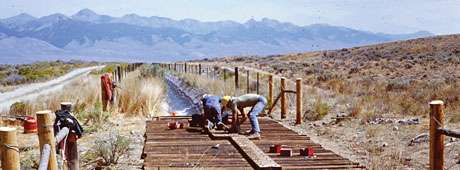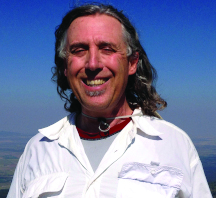No products in the cart.
Dry Creek Memories

Remote and Idyllic
By Tom Lopez
We never know where life will take us. Often we are bounced around like driftwood in a river by occurrences we could not have foreseen. Fortunately, my unforeseen bounces took me to the remote and idyllic Little Lost River Valley. This is a story that pieces together my observations and explorations with newspaper articles, government reports, and the memories of locals to paint a historical portrait of Dry Creek in the valley.
In October 1978, I moved to Salmon to work for the Bureau of Land Management (BLM), first as a data collector for the Challis Environmental Impact Statement and then as a range technician. When that temporary assignment ended, I secured a job as a crew leader for the BLM’s Young Adult Conservation Corps (YACC). The assignment began in Shoshone. Congress started the YACC in the economically stagnant year of 1977. It was designed to provide young people ages sixteen to twenty-three with one year of conservation-related employment, which theoretically would make them more employable. Like the Depression-era Civilian Conservation Corps, which inspired the YACC, the idea was that the country would receive the benefit of conservation-related projects undertaken by the enrollees.
After I had worked six months in Shoshone, the YACC budget was exhausted as a result of mismanagement on the federal level and everyone was laid off until the next fiscal year started on October 1. I picked up a summer job as a backcountry ranger for the Ketchum District of the Sawtooth National Forest. When that job ended and the new fiscal year began, I moved to Idaho Falls as a crew leader for the BLM’s district office.
These twists and turns, which eventually brought me to the Little Lost River Valley, remind me that much history disappears because few write about their experiences. People die and their stories are lost. The artifacts of their lives, like photos and letters sitting in dust-covered boxes, too often pass into oblivion, discarded as useless memories. When my mother was struggling with the cancer that eventually ended her life, I encouraged her to write about her childhood in southern Ohio. She asked, “Who would be interested?” My response was, “I’ve heard all your stories. They’re interesting and important history about the way things were. If you don’t record the history, it will be lost in time. Your grandchildren will never know.” Her handwritten memoir is one of my most prized possessions.
This content is available for purchase. Please select from available options.
Purchase Only
Purchase Only


Comments are closed.